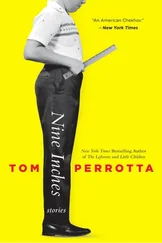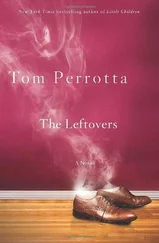“The Captain,” he said.
Ian's mouth dropped open. Despite his best efforts, Dave felt a smile spreading across his face. Mel blew his nose into Walter's handkerchief; the sound of it was audible across the room.
“Daryl Dragon was the Captain in the Captain and Tennille.”
“Son of a bitch.” Ian ran his fingers through his hair in a way that expressed his total amazement. “They should put you on Jeopardy.”
The first thing Dave noticed when he stepped up to the coffin was the microphone someone had tucked between Phil's crossed hands and white shirt, as though he'd been booked for a couple of gigs in heaven and wanted to arrive prepared. The unexpected sight of it—black, sleek, technological—made him wonder if, centuries from now, long after Phil himself had returned to dust, archaeologists from another civilization might dig up his grave and discover a pair of artificial hips and a microphone.
Dave never knew how to behave when confronted with the bodily presence of the dead. He didn't believe in God—at least not in a God who had nothing better to do than eavesdrop—so prayer seemed like a hollow gesture. Touching the corpse didn't strike him as an appealing option, either. So he just stood there, looking down at Phil, listening to his disembodied voice singing “You've Got a Friend,” and wondering why it was that the people in charge of these things had decided to use such a thick coating of powder on his face.
It seemed to him that Phil had a lot to be grateful for. He had lived a relatively long, relatively healthy life, and had remained active and clearheaded right up to the end. He had lasted long enough to make music with his grandson, and had died doing the thing he loved best. Everyone should be so lucky.
An image took hold of Dave's mind, a vision so vivid it was almost an out-of-body experience. He saw himself standing by his own coffin, gazing down at his own peaceful face. Julie stood nearby, a brave, still-attractive old woman surrounded by supportive children and the remaining Wishbones. There was music in the room, and a sadness muffled by soft music and conversation.
Ian cleared his throat, signaling Dave to move on, but he didn't feel like moving. If Ian hadn't kicked him in the ankle with the toe of his cowboy boot, he might have lingered there indefinitely, basking in the promise Phil seemed to offer of a long, satisfying life and a sudden, painless death.

Stan could only think of one thing sadder than a car with the keys locked inside, and that was a car with the keys locked inside and the engine still running.
A car like his own.
At least this time it was parked in front of his own house in the early evening, instead of after midnight in a godforsaken rest area somewhere north of Passaic. That was something to be grateful for.
He put his hands on the hood of the LeBaron and felt the living throb of the engine vibrate up his arms. It was time to pull himself together. Time to stop drinking, stop losing things, stop showing up late all the time.
Mostly, though, it was time to stop obsessing about Susie. Her nice round ass in his hands. Her sweet little tits. The way she clenched her teeth and whimpered like a puppy when she was about to come. The tattoo of a strawberry on her shoulder blade. Her habit, when the mood was right, of calling him “Garbanzo Bean.”
Hey, Garbanzo Bean, what's for supper? Gimme a kiss, Garbanzo Man. Don't be such a Garbanzo.
Garbanzo Bean. No wonder he locked his keys in the car and forgot what day it was.
He didn't have to walk far to find a decent rock, one that felt cool and substantial in his hand. He aligned himself with the target, wound up, and let fly. The rear driver's-side window exploded with a soft crumpling sound, showering the interior with broken glass.
Stan leaned into the car, reaching around the steering wheel to turn off the engine. Better me than some fucking car thief, he thought, shoving the keys into his pocket and glancing uneasily at the cloudless sky.
Warm water. He held his face in the pulsing stream, remembering the pleasure he'd felt as the rock erased the window. It was the kind of thing he could imagine doing again and again and again.
Climbing out of the shower, he felt alive again, nearly refreshed. The idea of spending his wife's twenty-seventh birthday at an old man's wake no longer seemed like a cruel joke. He thought about asking Dave and Buzzy to go out with him afterward, maybe to a club with music, or to one of those restaurant bars where the pretty secretaries went, hoping to meet a nice guy.
Why not? he thought. I'm a nice guy.
He opened the closet door and looked inside. It seemed so empty in there without Susie's clothes, the multicolored jumble of skirts and blouses, some of them sheathed in filmy plastic from the cleaners. After she left, he tried to rearrange his stuff to fill the available space, but the effect was vaguely disturbing, like a smile full of missing teeth.
He couldn't remember if he was supposed to dress like a Wishbone for the wake or not. Artie had mentioned something about it on the phone, but Stan hadn't really been listening.
Just to be on the safe side, he decided to go for the tux. Reaching for the hanger, he looked down by reflex and saw his missing dress shoes gleaming on the closet floor, right where they were supposed to be. The sight of them made his mouth taste funny.
Freshly dressed and mostly sober, he swept the glass off the front seat, climbed into his car, and set off into the night. The DJ on K-rock said it was the beginning of a commercial-free hour, one of those everyday events you couldn't help thinking of as a good omen.
He was coming down Central Avenue in West Plains, singing along with Melissa Etheridge, when it occurred to him that he didn't know where he was going. He had a clear memory of Artie saying, “We'll meet at the funeral home around seven,” but nothing beyond that. Not a word about which funeral home on what street, or even what town.
An unpleasant chill spread up the back of Stan's neck. He saw himself at that moment—a man in a tuxedo, driving nowhere in a car with a broken window—and was overcome by a feeling worse than simple embarrassment. For a few seconds he toyed with the idea that he was losing his mind.
In his heart, though, he didn't really believe it. He was just going through a bad patch, the kind of situation that took a toll on your day-to-day functioning. What he needed was some understanding, a little encouragement, a few kind words. Most of the guys in the band were sympathetic, especially Buzzy and Dave. Ian was okay too, though Stan hadn't been able to take him seriously for a long time now, ever since he'd learned that his real name was Frank. “Ian” was a stage name, borrowed from the lead singer in Jethro Tull. It was the kind of thing you didn't want to know about a grown man you thought of as a friend.
The problem was Artie. A decent manager would have patted him on the back and tried to help him through the mess. But Artie wasn't like that—Stan understood that now. Artie was a shark, the kind of guy who'd risk his life crossing a busy highway just for the chance to kick you while you were down.

Phil's widow had stopped crying by the time Dave shook her hand and told her how sorry he was. She introduced herself as Rose Cardini.
“Cardini?” he said. “Phil's last name was Cardini?” She looked amused. “What did you think it was?” “Hart,” he replied, feeling foolish as soon as he said it. “Back when he started out, most of the Italian performers changed their names to sound more American. That's how you got Dean Martin, Tony Bennett, people like that.” “Not Sinatra, though.”
Читать дальше













